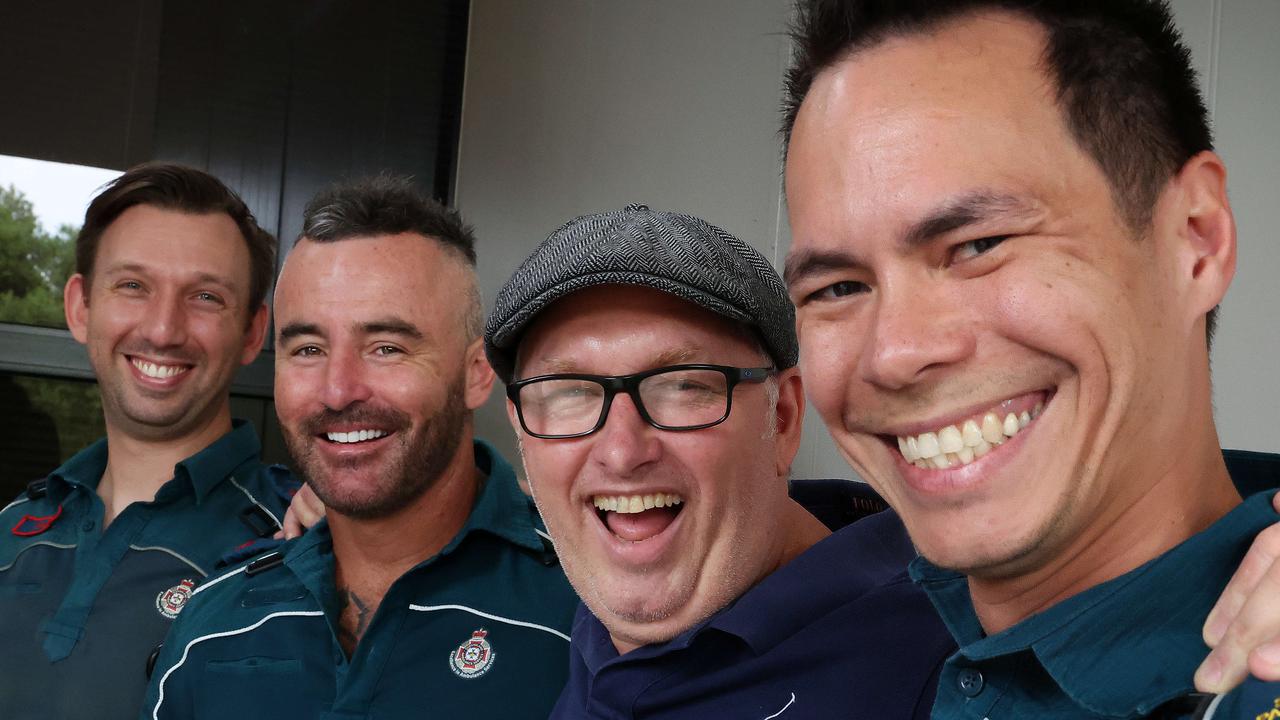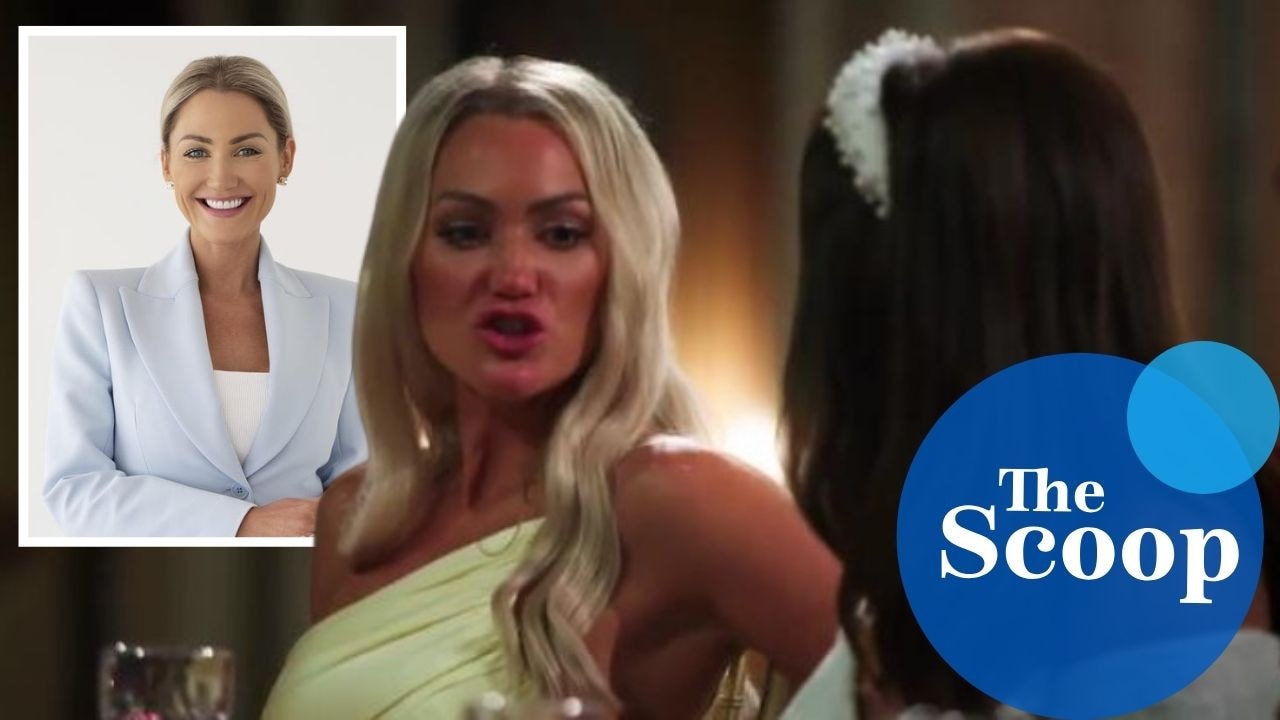‘Oh you have blown this’: Baz Luhrmann and Catherine Martin reveal private love story
Almost 40 years late, Baz Luhrmann can still recollect every little detail about the magic moment he met Catherine Martin for the very first time. This is their real-life love story.
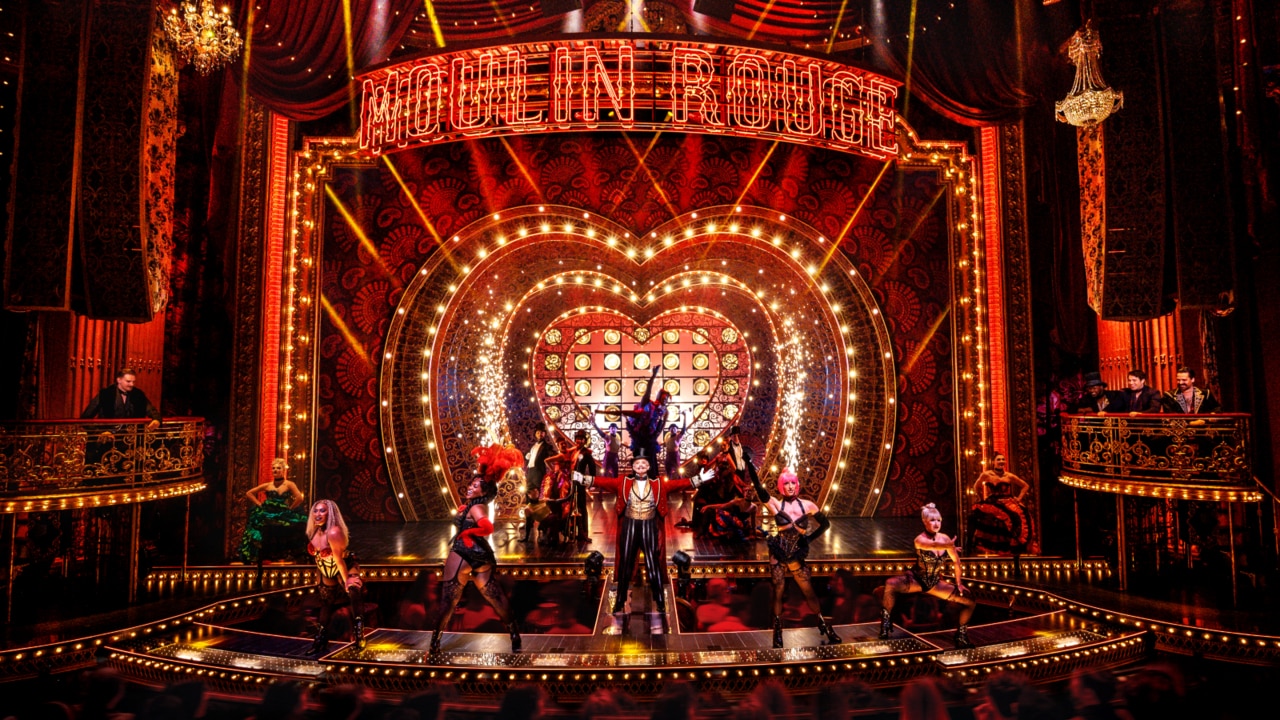
News
Don't miss out on the headlines from News. Followed categories will be added to My News.
It was a two-piece, linen olive-green suit, with a tiny thread emerging from its jacket. It’s a remarkable thing to remember almost 40 years later, but then again Baz Luhrmann has always had an eye for detail.
And he remembers every little thing about the first time he met the woman who would become his partner in creativity, life and sequins, Catherine Martin.
So does Martin, and in recounting their own, real life, meet-cute, it’s easy to see how it sparked a personal and professional collaboration which has produced some of stage and screen’s most fabled works, including last year’s rock and roll, cinematic extravaganza, Elvis.
But back to 1987, and a late and flustered Martin ringing on the doorbell of the office Luhrmann then shared with his longtime writing partner, Craig Pearce, above a brothel in Sydney’s Kings Cross.
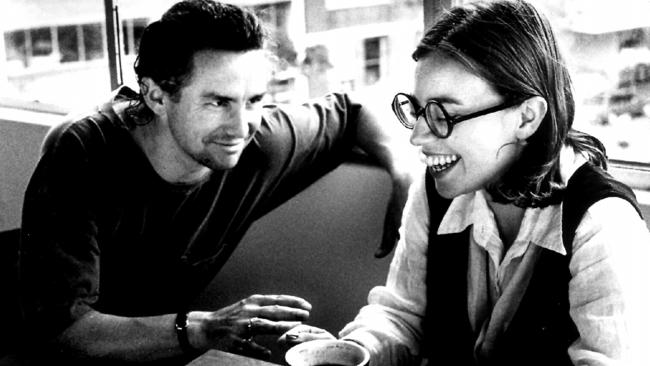
Luhrmann, not long graduated from National Institute of Dramatic Art (NIDA) and with his own fledgling theatre company, was on the lookout for creative talent and Martin, who studied design at NIDA, was cooling her heels outside his office for an interview.
“I was still sewing the buttons on by the time I was meant to be there, so I was standing outside the door where no-one was answering and thinking, ‘Oh you have blown this’, and then I turned around and there were these two blokes standing behind me wearing towels, which I remember thinking was very unprofessional,” she laughs.
It was Luhrmann and Pearce who had ducked out for a quick swim, and Luhrmann, for his part, remembers noticing the greens of the jacket, its stray thread, and thinking “Mmm, if she made that suit, she knows what she’s doing.”
He invited her inside, and they began to talk – and talk.
“What was meant to be about a 30-minute interview, went on for about eight hours,” Luhrmann recalls.
“We covered everything and everyone from Madonna to Bertold Brecht and I remember thinking I just wanted to keep talking to her forever.”
They’re still talking – today it’s about their 2001 film, Moulin Rouge, and its transformation from screen to stage in Moulin Rouge! The Musical, a 75-strong song and dance spectacle that opened on Broadway in 2019 and garnered an astonishing 10 wins at the 2021 Tony Awards, including Best Musical.
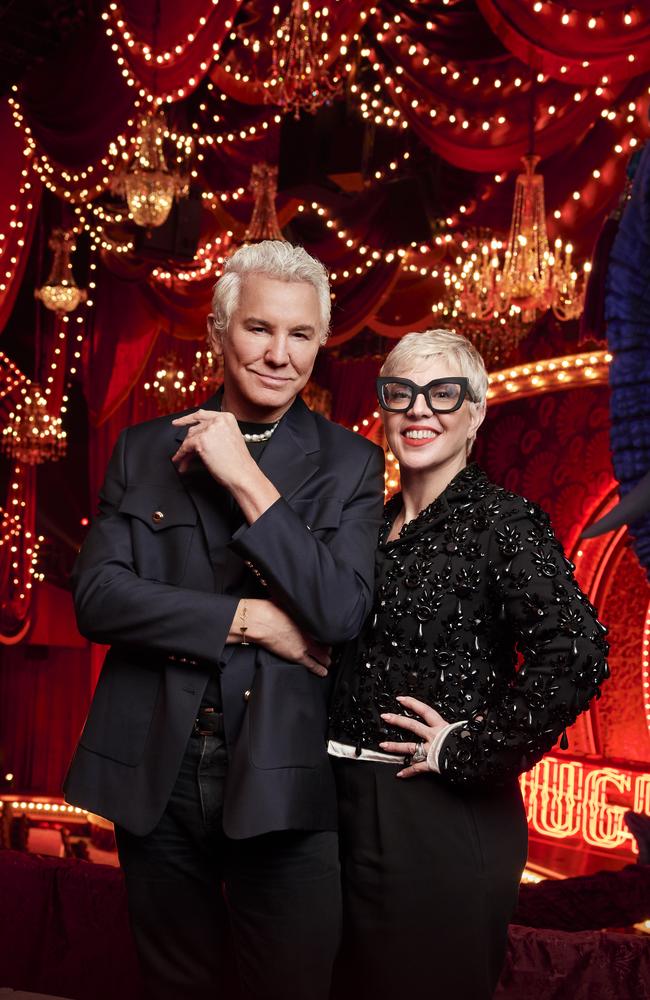
Currently, the Australian incarnation is at Brisbane’s Lyric Theatre, the musical has also played sellout seasons in Sydney, Melbourne and Perth and will return to Melbourne in August this year.
It’s also currently playing on Broadway, in London’s West End, and is due to open in Tokyo later this month.
And it began, as most things Luhrmann/Martin do, with a long conversation over a long lunch in 2009.
At their Sydney home, the couple met with producer Carmen Pavlovic, chief executive of Global Creatures, the company behind shows such as Walking With Dinosaurs, King Kong, and Muriel’s Wedding the Musical, to discuss crafting their film for theatre.
Pavlovic recalls: “We just connected on a very human level. We all had kids, we all believed that these big shows had to have humanity at their core, and we had all set up these companies that were very proud of their Australian heritage and believed they could stand shoulder to shoulder with the best in the world.”
Their collective hunch was correct – when Moulin Rouge! The Musical won the 2021 Tony Award for Best Musical, it was the first Australian production in history to do so.
It had been quite the journey to the winner’s circle.
It was 10 years after that long lunch that Moulin Rouge! The Musical opened on Broadway, only for the production to close a few months later, in August 2020, when a little known virus called Covid-19 shut down businesses – including the show kind – all over the world.
But in the time-honoured tradition of treading the boards, the show did eventually go on (and on – there will be 10 global productions by 2025) with Luhrmann and Martin both thrilled to be in the crowd for its recent Brisbane opening night.
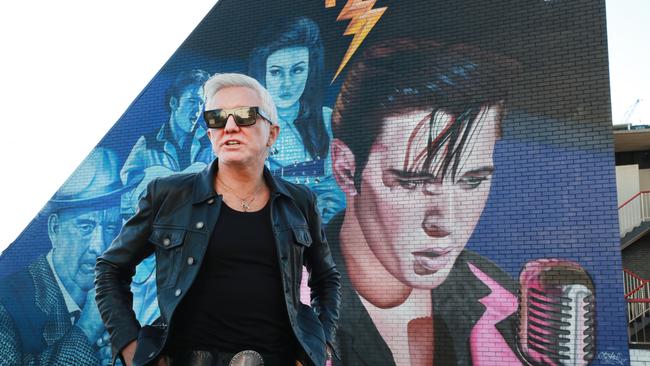
They were also happy to return to Queensland, where they bought a home during the long months of making Elvis on the Gold Coast during 2020 and 2021, and which they call (well and truly proving their local credentials), “the Goldy”.
“I love this place so much, there’s this energy in Brisbane, in Queensland that is very real. There is such a genuine love of arts and culture here that carries no false pretences. It’s not New York, and it doesn’t want to be New York. We travel around the world, our kids have travelled so much, but now we come to the Goldy for a kind of a reset,” Luhrmann says.
“We have put down our roots on the Goldy. You can use your wings, but you’ve got to have roots.”
Martin nods. “I agree, we just walk on the beach and kind of exhale. There is something very centering about the ocean. When we were making Elvis during the pandemic, Queensland was really good to us, and really good to our kids. It was not an easy time for anyone but we all just felt very welcome and it put its arms around our whole cast and crew.”
And when the red velvet curtains of Moulin Rouge! The Musical parted on opening night, Luhrmann says, it felt like coming “full circle”.
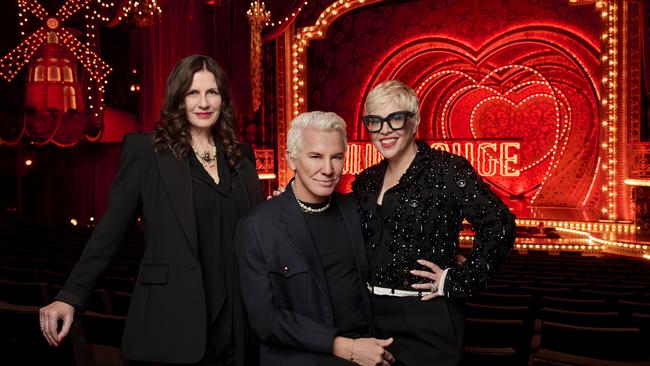
“I hadn’t actually had the chance to see the Australian cast yet, so to watch it all those years later, with our grown-up kids sitting beside us felt pretty amazing.”
It also felt, perhaps, a little bit like validation.
Because when Luhrmann’s 2001 musical tale of Belle Epoque Paris, its doomed lovers Christian and Satine – the so-called “Shining Diamond” of the famous nightclub – was first released, some critics took aim at the over-the-top lushness of it, particularly its central visual and contextual pillars of Truth. Beauty. Freedom and Love.
Luhrmann smiles, and suggests that today, those much pilloried pillars are needed more than ever.
“I do remember when our film came out, it was met with some cynicism. Truth. Beauty. Freedom. Love. was kind of passed off as an advertising line, or a sort of gimmick. Even before it came out, Will Ferrell did this brilliant take-off of it on Saturday Night Live to Everybody was Kung Fu Fighting, and it was really funny. But for us, it sincerely was a fundamental mantra taken from the essence of what bohemianism was at that time. And it turns out, especially post-Covid, that those values are much, much needed.”
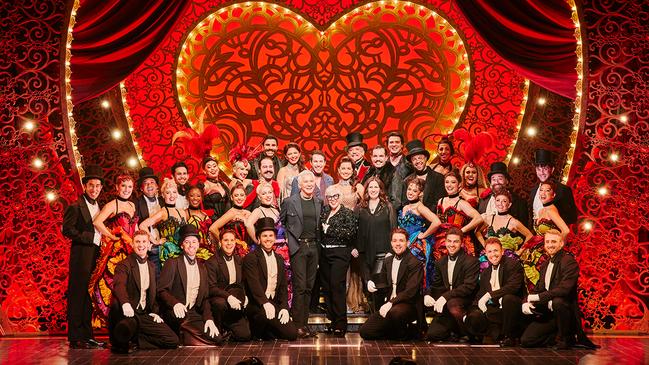
Martin nods from behind her signature, bold glasses. “I feel exactly the same. Moulin Rouge is about being free to pursue your creative dreams, being free to love who you want to love, about telling the truth about who you are. And it’s about beauty, but not beauty in that classical, exclusionary sense, but true beauty which is about celebrating the best in all of us. We need these values at this time in history when the algorithm online is encouraging conflict, and you get far more clicks if you’ve got a polarising opinion.”
It’s fair to say that Luhrmann is no stranger to polarising opinions.
From the moment he cha-cha’d his way on to the cinematic scene with his exuberant directorial debut, 1992’s Strictly Ballroom, the Sydney-born auteur’s films have been as sniffed at by some critics as they are adored by his fans.
His award-winning films, including Romeo and Juliet (1996), Moulin Rouge (2001) Australia (2008) The Great Gatsby (2013), and 2022’s Elvis, have been dismissed by some reviewers as too gaudy, too over-the-top, in short, too much.
Luhrmann shrugs, delivering what just might be the understatement of the (filmic) year.
“I’m not much of a middle guy. I’m a very high or very low guy, or both, but never,” he grins, “in the middle.’’
Luhrmann says he has an “open-minded” relationship with critique, as long as it “gives the audience an idea of what they are actually going to experience”.
“You know, with Elvis, some guy wrote a review really early on, and while you cannot live or die by reviews, I think you can expect them to at least be informed, or accurate, and this one was neither. I don’t think that’s right when you have so many people giving everything they have to a film like that.’’
For both Luhrmann and Martin, it seems like Elvis is yet to leave the building. Shooting the biopic with Austin Butler (who earned an Academy Award nomination for his astonishing turn as Presley) was both exhilarating and exhausting; as Colonel Tom Parker might say, one hell of a hayride.
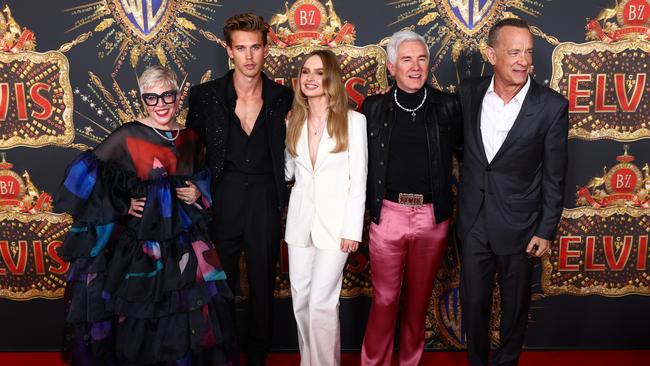
“People do still want to talk about Elvis, and at some stage there has to be a moment where you say ‘I’m not talking about it anymore’,”Martin muses. “Not because you don’t love it, or aren’t proud of it because I am, immensely so, but because you need some space and distance to move on to your next creative project.”
Luhrmann adds, “It’s not so much a debriefing, but a distancing, and that’s what sitting watching Moulin Rouge! The Musical gave me. Just to be able to sit there and watch something you created more than 20 years ago become something else in someone else’s hands. It was a nice feeling of just letting go.”
Both Luhrmann and Martin acted as creative consultants on the musical, Luhrmann describing his part in its adaptation as that of an “uncle”, offering notes only when asked.
“To be honest it wasn’t hard to back off, I was 37 when I made Moulin Rouge, and for me to try to be that person who made it would be impossible and wrong-footed. You have to know when to let very talented people like Carmen, like Alex (director Alex Timbers) and John (writer John Logan) and everyone involved do their thing because they know their thing and they do it so well.”
When the film was released it used what is now called in show terms “a conceit”. This was to place contemporary songs in a period setting, now very common (think Bridgerton, Stranger Things) but then considered radical. And not everybody liked it.
This time around, Luhrmann admits he “had a moment’ when the producers said they wanted to put new music in, before realising that “of course that was perfect, to be able to keep the classics from the film and then feel the Zeitgeist of the moment with some Beyonce, a little Adele. And when I saw and heard what they had done with it, well I was just thrilled”.
Here’s the thing about Luhrmann and Martin. It all still thrills them. They still stay up late for hours talking about whether this piece of material belongs in this scene, this song, this piece of poetry.
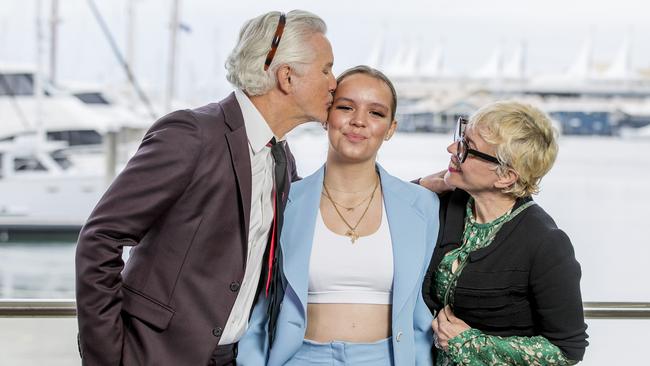
They remain, Baz says, those true bohemians who met outside a Sydney brothel all those years ago.
“We’re just old bohemians now,” he laughs.
And here’s the thing about Baz Luhrmann.
He remains, at heart, the kid who grew up in Herons Creek, NSW, a small country town where his mother was a ballroom dance teacher and his father ran the service station and – for a time – a movie theatre.
He remains the boy who watched musicals in that theatre and dreamed of something more. Much, much more. Somewhere more exciting. Glamorous. Big. Bold. Somewhere where he would belong.
All of Luhrmann’s films have outsiders in them, people who don’t quite fit in. Circus performers. Misshapen artists. Star-crossed lovers. Hustlers and hawkers. And all of them, he says, are him. “Without going too deeply into my childhood, you know, we were the outsiders. We were the oddballs. Because we lived in this small town and we did ballroom dancing. We wore the white shorts and socks and we stood out and people shunned us. And so I love those people, because I understand them.”
And celebrates them, writ large, beautifully broken, dancing across the stage and screen.
More Coverage
Originally published as ‘Oh you have blown this’: Baz Luhrmann and Catherine Martin reveal private love story



